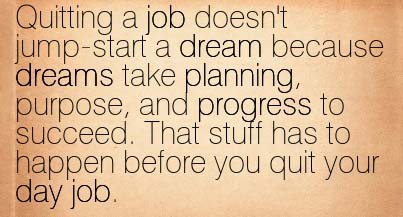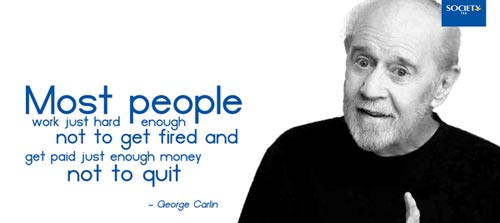Life
10 Questions to Ask Yourself Before Quitting Your Job

Admit it? You’ve wondered if you should take the plunge.
You detest working for an unappreciative company every day, you’re un-challenged, and you have no chance of getting promoted, no matter how much you bust your butt.
Maybe it’s time to face the music?
And accept the fact that you’re seriously unhappy in your job, and nothing will change that.
So you can’t help wondering?
Why not do what many others have done before you? Pursue your dream, follow your passion, become an entrepreneur, and be happy?
If the above describes you, then, yes, you should seriously consider that option.
The following 10 questions will help you to get started
1. Do I really want to work for myself?
Is this business or entrepreneurship in general really something you dream about?
Or are you just trying to escape something you don’t like, such as your current boss, your daily commute, or your industry?
If you’re serious about entrepreneurship and following your passion, that’s great. But if you’re just upset with your boss, that is not a good enough reason to quit your job and seek entrepreneurship.
2. Am I willing to lose my significant other and alienate my friends and family?
If your partner, friends, and family are not fully behind your pursuit of entrepreneurship, it will strain these relationships, maybe even end them all together.
If you aren’t willing to go through these changes in your relationships, quitting your job to pursue your dreams might not be for you. If you are, you may find that the new relationships you develop are what you had been yearning for all along.
3. Will I be able to support myself for a year as a Start Up?
The least risky way into entrepreneurship is what Derek Sivers (Founder of CD Baby) calls The Tarzan Technique.
Stay gainfully employed, start your own business as a side hustle, and quit your current job when you can monetize your business.
Like Tarzan swings through the jungle, don’t let go of the old support until you have a firm grip on the new one, and then keep swinging.
4. Am I willing to work 80 hours a week?
Like Lori Greiner said,
“Entrepreneurs are willing to work 80 hours a week to avoid working 40 hours a week.”
Starting your own business means you have to do whatever it takes, and that is not always fun.
You will face long working hours and sleepless nights, but all that you sacrifice now is only to have more of it in the future.
If this is too much of a detriment for you, getting into entrepreneurship might not be for you, so keep your job.
5. Can I live with failure?
Failure is part of the journey to success; just ask any wildly successful person. They have all failed more than once? Nothing to be afraid of.
You might fail, but it’s a chance to learn and just another stepping-stone to your success.
The only real failure is doing nothing simply because you’re too afraid to make a mistake.
After all, what is the worst that can happen? That you may end up exactly where you are right now.
If you cannot live with failure, entrepreneurship is not for you. If you think you can, great.

6. Can job security totally ruin my life?
Many people see staying gainfully employed as a safer choice.
But it’s probably fair to say that if you spend most of your waking hours living in misery in exchange for job security, doing so would ruin your life.
If questionable job security means more to you than pursuing your dream, starting your own business is most likely not a good idea.
7. How disciplined am I?
If you want to be your own boss, you must be able to motivate yourself.
This can be difficult, especially at the beginning when customer demands aren’t yet forcing you to be productive.
If you know you lack discipline, quitting your job to pursue your dreams might not be right for you.
8. Does my passion fulfill a market need?
Breaking free, chasing your dreams, and following your passion can be a fantastic thing to do, but if your passion has to pay your bills, you need to look at it as a business too? Or you will be broke.
Remember, clients spend money on services that fulfill their own desires. You can only be happy and financially successful by following your passion, one that fulfills a need the market has.
If there is no market for what you’re passionate about, you should not quit your job as it will lead to financial disaster.

9. What do I suck at?
There must be some stuff you?re not so good at. So what is it?
Before you jump into entrepreneurship, you must have the skills to make your business a success.
Close your skill gap, and brush up on social media marketing and the latest trends.
Staying current is critical to your success. If you are completely unaware of what you suck at, you are not ready to start a business.
In a twisted way, knowing what is holding you back is your best recipe for success, in almost everything.
10. Are you willing to put your ego aside for your business?
As a young entrepreneur, you must be able to understand and listen to your customers, process feedback, and improve what’s needed, even if it’s very personal.
And despite all the tippy-toe dances, you still have to be the boss.
Make sure your EGO doesn’t get in the way.
It will probably tell you that you know it all (remember #9), kill your objectivity, and give you tunnel vision.
If you can’t control your EGO, you’re not ready for entrepreneurship yet.
What’s the Point?
Do you think you’re ready to quit your job to pursue your dreams, follow your passion, and become a successful entrepreneur?
I’d love to tell you that taking the plunge into entrepreneurship is a breeze.
I’d love to tell you that it’s going to be easy.
I’d love to tell you that you can do it between lunch and dinner.
But you already know that I won’t do that, right?
You have heard dishonest, “How To” advice many times before, but we won’t lie to each other, will we?
Getting out there and creating a future is a big thing, and it’s hard work. But if you answered “yes” to the questions above, it’ll all be worth it in the end.
If you’re ready to take the plunge, don’t procrastinate any longer.
Start now; a life you love awaits you. So hurry up; what are you waiting for?
Did You Know
How Skilled Migrants Are Building Successful Careers After Moving Countries
Behind every successful skilled migrant career is a mix of resilience, strategy, and navigating systems built for locals.

Moving to a new country for work is exciting, but it can also be unnerving. Skilled migrants leave behind familiar systems, networks, and support to pursue better job opportunities and a better future for their families. (more…)
Life
10 Research-Backed Steps to Create Real Change This New Year
This New Year could finally be the one where you break old patterns and create real, lasting change.

Every New Year, we make plans and set goals, but often repeat old patterns. (more…)
Life
9 Harsh Truths Every Young Man Must Face to Succeed in the Modern World
Before chasing success, every young man needs to face these 9 brutal realities shaping masculinity in the modern world.

Many young men today quietly battle depression, loneliness, and a sense of confusion about who they’re meant to be.
Some blame the lack of deep friendships or romantic relationships. Others feel lost in a digital world that often labels traditional masculinity as “toxic.”
But the truth is this: becoming a man in the modern age takes more than just surviving. It takes resilience, direction, and a willingness to grow even when no one’s watching.
Success doesn’t arrive by accident or luck. It’s built on discipline, sacrifice, and consistency.
Here are 9 harsh truths every young man should know if he wants to thrive, not just survive, in the digital age.
1. Never Use Your Illness as an Excuse
As Dr. Jordan B. Peterson often says, successful people don’t complain; they act.
Your illness, hardship, or struggle shouldn’t define your limits; it should define your motivation. Rest when you must, but always get back up and keep building your dreams. Motivation doesn’t appear magically. It comes after you take action.
Here are five key lessons I’ve learned from Dr. Peterson:
-
Learn to write clearly; clarity of thought makes you dangerous.
-
Read quality literature in your free time.
-
Nurture a strong relationship with your family.
-
Share your ideas publicly; your voice matters.
-
Become a “monster”, powerful, but disciplined enough to control it.
The best leaders and thinkers are grounded. They welcome criticism, adapt quickly, and keep moving forward no matter what.
2. You Can’t Please Everyone And That’s Okay
You don’t need a crowd of people to feel fulfilled. You need a few friends who genuinely accept you for who you are.
If your circle doesn’t bring out your best, it’s okay to walk away. Solitude can be a powerful teacher. It gives you space to understand what you truly want from life. Remember, successful men aren’t people-pleasers; they’re purpose-driven.
3. You Can Control the Process, Not the Outcome
Especially in creative work, writing, business, or content creation, you control effort, not results.
You might publish two articles a day, but you can’t dictate which one will go viral. Focus on mastery, not metrics. Many great writers toiled for years in obscurity before anyone noticed them. Rejection, criticism, and indifference are all part of the path.
The best creators focus on storytelling, not applause.
4. Rejection Is Never Personal
Rejection doesn’t mean you’re unworthy. It simply means your offer, idea, or timing didn’t align.
Every successful person has faced rejection repeatedly. What separates them is persistence and perspective. They see rejection as feedback, not failure. The faster you learn that truth, the faster you’ll grow.
5. Women Value Comfort and Security
Understanding women requires maturity and empathy.
Through books, lectures, and personal growth, I’ve learned that most women desire a man who is grounded, intelligent, confident, emotionally stable, and consistent. Some want humor, others intellect, but nearly all want to feel safe and supported.
Instead of chasing attention, work on self-improvement. Build competence and confidence, and the rest will follow naturally.
6. There’s No Such Thing as Failure, Only Lessons
A powerful lesson from Neuro-Linguistic Programming: failure only exists when you stop trying.
Every mistake brings data. Every setback builds wisdom. The most successful men aren’t fearless. They’ve simply learned to act despite fear.
Be proud of your scars. They’re proof you were brave enough to try.
7. Public Speaking Is an Art Form
Public speaking is one of the most valuable and underrated skills a man can master.
It’s not about perfection; it’s about connection. The best speakers tell stories, inspire confidence, and make people feel seen. They research deeply, speak honestly, and practice relentlessly.
If you can speak well, you can lead, sell, teach, and inspire. Start small, practice at work, in class, or even in front of a mirror, and watch your confidence skyrocket.
8. Teaching Is Leadership in Disguise
Great teachers are not just knowledgeable. They’re brave, compassionate, and disciplined.
Teaching forces you to articulate what you know, and in doing so, you master it at a deeper level. Whether you’re mentoring a peer, leading a team, or sharing insights online, teaching refines your purpose.
Lifelong learners become lifelong leaders.
9. Study Human Nature to Achieve Your Dreams
One of the toughest lessons to accept: most people are self-interested.
That’s not cynicism, it’s human nature. Understanding this helps you navigate relationships, business, and communication more effectively.
Everyone has a darker side, but successful people learn to channel theirs productively into discipline, creativity, and drive.
Psychology isn’t just theory; it’s a toolkit. Learn how people think, act, and decide, and you’ll know how to lead them, influence them, and even understand yourself better.
Final Thoughts
The digital age offers endless opportunities, but only to those who are willing to take responsibility, confront discomfort, and keep improving.
Becoming a man today means embracing the hard truths most avoid.
Because at the end of the day, success isn’t about luck. It’s about who you become when life tests you the most.
Change Your Mindset
The Four Types of Happiness: Which One Are You Living In?
Most people chase success only to find emptiness, this model reveals why true happiness lies somewhere else.

In a world driven by rapid technological growth and constant competition, many people unknowingly trade joy for achievement. (more…)
-

 News3 weeks ago
News3 weeks agoBrandon Willington Builds 7-Figure Business by Ignoring Almost Everything
-

 Health & Fitness3 weeks ago
Health & Fitness3 weeks agoWhat Minimalism Actually Means for Your Wellness Choices
-

 Did You Know3 weeks ago
Did You Know3 weeks agoWhy Most Online Courses Fail and How to Fix Them
-

 Business3 weeks ago
Business3 weeks agoIf Your Business Internet Keeps Letting You Down, Read This
-

 Business2 weeks ago
Business2 weeks agoEntrepreneur’s Guide to Pay Stubs: Why Freelancers and Small Business Owners Need a Smart Generator
-

 Business1 week ago
Business1 week agoThe Salary Shift Giving UK Employers An Unexpected Edge
-

 Business2 weeks ago
Business2 weeks agoThe Simple Security Stack Every Online Business Needs
-

 Scale Your Business1 week ago
Scale Your Business1 week ago5 Real Ways to Grow Your User Base Fast




























3 Comments